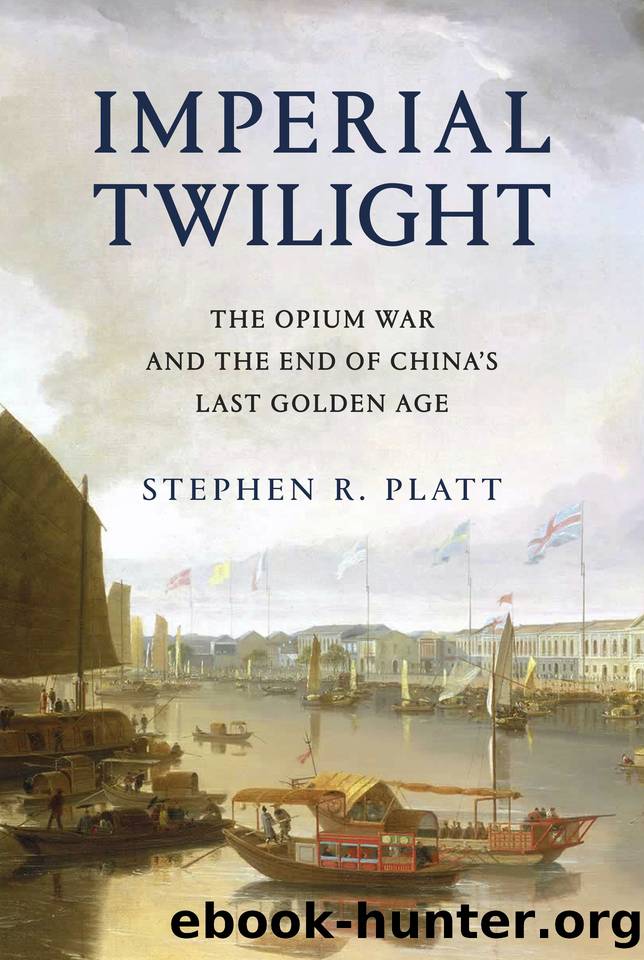Imperial Twilight: The Opium War and the End of China's Last Golden Age by Stephen R. Platt

Author:Stephen R. Platt [Platt, Stephen R.]
Language: eng
Format: epub
Tags: History, War, China, Military History
Amazon: B07B2W1W8M
Goodreads: 36296465
Publisher: Knopf
Published: 2018-05-14T22:00:00+00:00
* * *
—
Though the voyage of the Lord Amherst had little effect in China beyond causing a flurry of agitated reports to the throne from coastal officials, in Great Britain and America it was a bombshell. For what Gutzlaff and Lindsay claimed to reveal in their accounts of the journey, which ran into multiple printings in Europe and the United States, was that China was no longer the closed empire of the past; the emperor was no longer fully in control, foreigners were no longer frozen out. Wishful as it may have been, the message Lindsay and Gutzlaff brought back—one that echoed Thomas Manning’s experience in Tibet twenty years earlier—was that the ordinary people of China were perfectly friendly and open toward foreigners. The Chinese themselves wanted free trade, they insisted, and it was only the officials of the Qing government who stood in their way. In other words, the British represented the will of the Chinese people better than their own government did.
In essence, Lindsay and Gutzlaff had identified a wedge they believed could be driven right through the firmament of China: a natural alliance of British trade interests and the multitude of Chinese merchants with their desire for free commerce, both of them set against the jealous government of the Manchus. All of the exclusiveness, the restrictions, and the close management of trade that had defined the Canton commerce for so long were, Lindsay claimed, the products of a government that no longer enjoyed the full support of its subjects. A simple push from the outside and the whole system would topple from within.
There were joyous reactions to the Lord Amherst’s voyage in Britain and America. In London, the Eclectic Review declared that it “places the character of the natives altogether in a new light, and opens to us the most cheering prospect as to the possibility of wholly breaking down the partition which has for ages separated from civilized society a fourth portion of the human race.”10 The Times lauded Gutzlaff’s revelations that “as a nation, China is politically weak,” that its naval defenses were “contemptible,” that the government had “no hold on the affections of the people,” and that the officials were “cowardly, corrupt, and excessively cringing.” But the ordinary people of China—the people!—were, the Times was delighted to report to its readers, “hospitable, kind, and eager to establish an intercourse with foreigners.”11
In America, newspapers called Gutzlaff “one of the most extraordinary men of the age.”12 Legions of missionary writers quoted his potent declaration, “We are entirely erroneous about China.” China was not a closed country, said Gutzlaff, but in fact “no country in Asia, ruled by native princes, is so easy of access.”13 According to believers on both sides of the Atlantic, be they believers in commerce or religion, the voyage of the Lord Amherst revealed the mysterious country of China in a new light: not as some impenetrable, reclusive empire but as a market for free commerce and a field for Christian conversion that was all but begging to be opened by the West.
Download
This site does not store any files on its server. We only index and link to content provided by other sites. Please contact the content providers to delete copyright contents if any and email us, we'll remove relevant links or contents immediately.
| Africa | Americas |
| Arctic & Antarctica | Asia |
| Australia & Oceania | Europe |
| Middle East | Russia |
| United States | World |
| Ancient Civilizations | Military |
| Historical Study & Educational Resources |
The Story of China by Michael Wood(961)
Mr. Selden's Map of China by Timothy Brook(811)
Philippines--Culture Smart! by Culture Smart!(712)
Heroic Hindu Resistance To Muslim Invaders (636 AD to 1206 AD) by Sita Ram Goel(702)
Akbar: The Great Mughal by Ira Mukhoty(673)
First Platoon by Annie Jacobsen(664)
Vedic Physics: Scientific Origin of Hinduism by Raja Ram Mohan Roy(663)
The Meaning of India by Raja Rao(662)
Food of India by unknow(661)
Banaras by Diana L. Eck(653)
India--Culture Smart! by Becky Stephen(629)
China Unbound by Joanna Chiu(628)
North of South by Shiva Naipaul(626)
Mao's Great Famine: The History of China's Most Devastating Catastrophe, 1958-1962 by Frank Dikötter(619)
Insurgency and Counterinsurgency by Jeremy Black(597)
The Genius of China: 3,000 Years of Science, Discovery, and Invention by Robert Temple(596)
A History of Japan by R.H.P. Mason & J.G. Caiger(588)
How to Be a Modern Samurai by Antony Cummins(587)
The Digital Silk Road by Jonathan E. Hillman(581)
